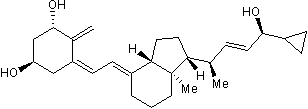Additional VDR-like Receptor Compounds: Small Molecules and Peptides
Vitamin D Receptor (VDR; NR1I1) is a member of the steroid receptor family related to the PXR and CARs. The natural ligand of VDR is 1, 25 di-hydroxyvitamin D3. VDR is expressed in osteoblasts, osteocytes, osteoclasts, bone, bone marrow, thymus and small intestine. VDR plays critical roles in calcium homeostasis, bone development and mineralization, as well as control of cell growth and differentiation. RXRs are the major partners for VDR since by heterodimerizing with VDR, they increase their DNA-binding affinity and select the correct spacing of direct repeat elements.
1 result for "Additional VDR-like Receptor Compounds Small Molecules and Peptides" in Products
1 result for "Additional VDR-like Receptor Compounds Small Molecules and Peptides" in Products
Additional VDR-like Receptor Compounds: Small Molecules and Peptides
Vitamin D Receptor (VDR; NR1I1) is a member of the steroid receptor family related to the PXR and CARs. The natural ligand of VDR is 1, 25 di-hydroxyvitamin D3. VDR is expressed in osteoblasts, osteocytes, osteoclasts, bone, bone marrow, thymus and small intestine. VDR plays critical roles in calcium homeostasis, bone development and mineralization, as well as control of cell growth and differentiation. RXRs are the major partners for VDR since by heterodimerizing with VDR, they increase their DNA-binding affinity and select the correct spacing of direct repeat elements.
Vitamin D3 analog
| Alternate Names: | MC 903 |
| Chemical Name: | (1α,3β,5Z,7E,22E,24S)-24-Cyclopropyl-9,10-secochola-5,7,10(19),22-tetraene-1,3,24-triol |
| Purity: | ≥98% (HPLC) |

